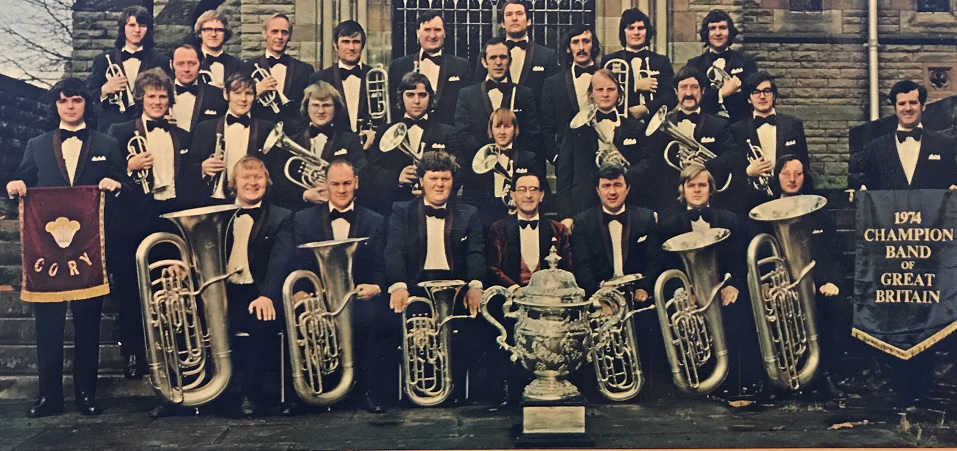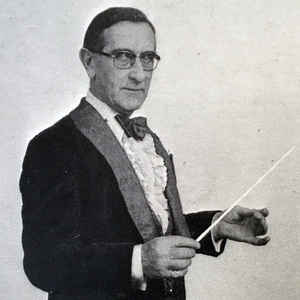
In the modern brass banding world four British Army ‘Majors’ have made a significant impact: Three of them did so in Yorkshire - the fourth found his way to South Wales.
And whilst Majors Jaeger, Willcocks and Parkes will forever be associated with Black Dyke Mills Band, the name of Major Horatio Arthur Kenney will be indelibly linked to that of Cory.
Born in Iver, Buckinghamshire in 1919, by the age of six he was being educated at Wells Cathedral School in Somerset where he was a chorister. He quickly became an accomplished singer before enlisting as a Band Boy into the Somerset Light Infantry on trombone in 1934.
He served as an infantryman during the war and in 1945 became a student at Kneller Hall where he was awarded the Worshipful Company of Musician’s Medal for the Most Outstanding Student of his class.
In addition he also gained the prestigious Director’s Prize for Conducting and the Commandant’s Prize for composing the best march - thought to be the rousing ‘St. Julien’, which he recorded with Cory in 1970.
Military progress
His musical talent was obvious as he progressed through the musical military ranks.
He started off as Bandmaster of the 1st Battalion the Oxfordshire & Bucks Light Infantry in 1949, and by 1962 was Director of Music to the Band of the Welsh Guards. He later became Captain and then Major - the culmination of his career, the leading of the musical accompaniment to the Investiture of the Prince of Wales in Caernavon in 1969.
He had already had a brief encounter with the brass band world - conducting Yorkshire Imperial Metals at the 1965 North Eastern Area, but with the Cory Band facing a contesting predicament in 1970 he received a telephone call from Band Secretary Gwyn Dackins that was to change the course of their joint banding history.
Later that year he resigned his commission and returned to civilian life.
He had already had a brief encounter with the brass band world - conducting Yorkshire Imperial Metals at the 1965 North Eastern Area, but with the Cory Band facing a contesting predicament in 1970 he received a telephone call from Band Secretary Gwyn Dackins that was to change the course of their joint banding history.
A little lie
The initial request was to take the band to one of the local association contests on the test-piece, ‘Sinfonietta’ by Erik Leidzen. Asked if he knew it, Arthur Kenney lied. “Of course, I know it very well,” he said.
He had never seen the piece before in his life.
The initial request was to take the band to one of the local association contests on the test-piece, ‘Sinfonietta’ by Erik Leidzen. Asked if he knew it, Arthur Kenney lied. “Of course, I know it very well,” he said.
The band had no reason to be worried however, as at his first rehearsal he worked his way through the score without an inkling of apprehension felt around the stands. As one player later related; “He arrived on time and with the minimum of fuss worked his way steadily through the test-piece, his eyes riveted to the score.
We later learned this was so uncharacteristic of him because he conducted most of his contest performances from memory. He had sight read it. We were none the wiser.”
The players were in awe. Encouraging, authoritative, brilliantly musical, he captured their imagination and their loyalty in an instance.
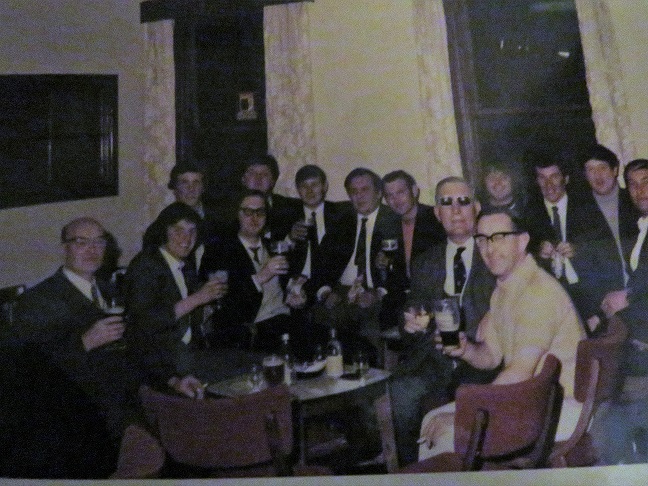
Ones to watch...
One to watch
The next four years prepared the ground for what was to follow; slowly but surely creating a formidable ensemble - one that Geoffrey Brand, then conducting Black Dyke Mills Band marked as “one to be watched with interest.”
He wasn’t wrong.
A hat-trick of victories came at the National Mineworkers Championship (1970-1972), the inaugural Granada Band of the Year title was won in 1971 and Welsh Area titles secured in 1972 and again in 1974. A marker was also laid at the 1972 British Open and National, where they came third and fifth respectively.
That Granada success came at just two weeks notice, with contest organiser Bram Gay later saying: “That wasn’t sheer genius on their part – they’d done something very similar a couple of weeks before for Harlech Television and they knew what to do.
I began to mould them into my way of thinking and from nothing there came an affinity which cannot be put into words. It was as though they knew what I was thinking and I could feel just what was needed from me in order to produce from them an inspired and uplifting performance.”
Arthur Kenney of course - he’s a natural for that sort of trick anyway. So, they won it and that seemed to give them a big start. I think perhaps that it accelerated their rise to first rate levels.”
Perhaps so, but as Major Kenney himself recalled in 1984; “When I arrived on the scene in Autumn 1970 I was tremendously lucky in that I inherited a band which over the years had gradually grown like a seedling and was nearing maturity.
I began to mould them into my way of thinking and from nothing there came an affinity which cannot be put into words. It was as though they knew what I was thinking and I could feel just what was needed from me in order to produce from them an inspired and uplifting performance.”
Coming of age
That maturity came of age in October 1974 at the Royal Albert Hall.
Drawn 15 amongst the titans of a 19 band field including Black Dyke Mills, Grimethorpe Colliery and G.U.S (Footwear), their performance of ‘Fantasy for Brass Band’ created history, although their soprano player Gwyn Thomas, was stuck by one single moment on an unforgettable day.
“What sticks in my mind was that Harry Mortimer came out of the hall and came straight over to me. He just shook my hand and congratulated me and said, ‘The winners always smile. Just remember that’.”
They didn’t stop smiling until they got back to Treorchy - and then celebrated in style at Gwyn’s father’s pub.
What followed however came as a shock.
Peripatetic existence
Major Kenney was always a man with financial concerns, ones that were to trouble him throughout the rest of his life.
Offered an attractive wage packet he left for Carlton Main Frickley and the start of a somewhat unpredictable, peripatetic existence that also saw him conduct the likes of the Soundwell Band near Bristol, Wingates Temperance, Ever Ready and Llansaint amongst others.
During this time, he wrote a much under-rated ‘Concerto for Tenor Horn’ recorded with Brian Rostron as the soloist, and then took up a lucrative, if somewhat ill-fated military appointment in Tripoli establishing a school for Libyan military musicians.
Many had written him off as a spent force on his return to the UK, but then, in 1981, his genius sparkled once again - and this time at the British Open as he led the unfancied (although not a rank outsider) of City of Coventry to the title on ‘Variations on a Ninth’.
It was to prove the catalyst that ignited the peak years of his creative musical brilliance. His return to Cory saw them claim a historic National ‘hat-trick’ in 1982/83/84.
And whilst the combination just missed out on the European title (with five consecutive podium finishes from 1982 to 1986) and never found favour at the British Open, Cory restored their position as one of the world’s finest bands.
Many had written him off as a spent force on his return to the UK, but then, in 1981, his genius sparkled once again - and this time at the British Open as he led the unfancied (although not a rank outsider) of City of Coventry to the title on ‘Variations on a Ninth’.
High expectations
Recalling that historic period of success, Tuba player John Prosser said: “He had high expectations of all his players and, not surprisingly, they worked hard to fulfil them.”
The preparation for ‘Contest Music’ in 1982 was pinpointed: “It was going extremely well and although he was a super interpreter of all kinds of music, he was particularly sensitive to the flow and phrasing of slow music.
Sitting in the bass section at the back of the band and listening to the emotive passages in the second movement was simply breath - taking during rehearsals. Every phrase and nuance was captured.”
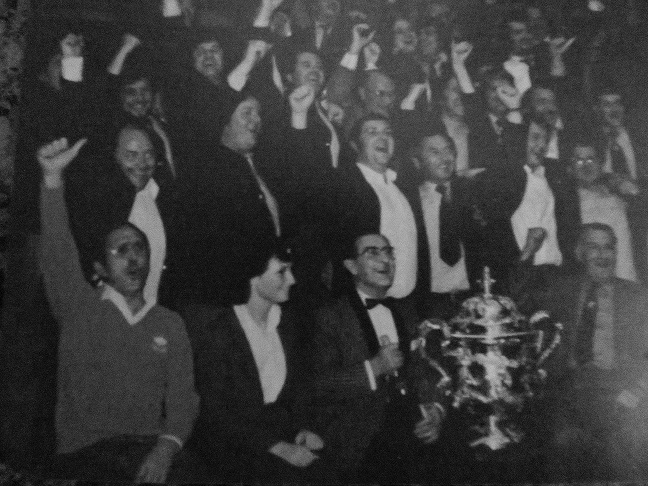
The taste of success...
The 1983 success on ‘Ballet for Band’ even saw his wife Barbara present her ideas of the imaginary score. “She had obviously spent hours listening to the music and choreographing the whole performance in her mind with him.
Whether this had any impact on our performance one will never know, but it did stimulate the imagination.”
The hat-trick on ‘Dances & Arias’ was the most complete of all, as John added: “We were sitting on the stage with all the usual chatter around the hall.
He strode to the podium, turned to the audience, then to the band and lifted his baton; it was so quiet. I thought it impossible for such a large crowd to be totally silent.
From there everything grew in stature – even Major Kenney himself. At the end the audience erupted into tumultuous applause, a sound that will live with me forever!”
This was the genius of Arthur Kenney: Small of stature, yet a giant of musical talent.
Apex
It was to be the apex of Major Kenney’s brass band career.
The November 1984 edition of Brass Band News summed it up perfectly: “Hat-tricks are rare and popular; the upward thrusting fist of the diminutive Major Kenney as he came on stage to accept the award, embodied an explosive exhilaration which was shared by the vast majority of the audience.”
This was the genius of Arthur Kenney: Small of stature, yet a giant of musical talent.
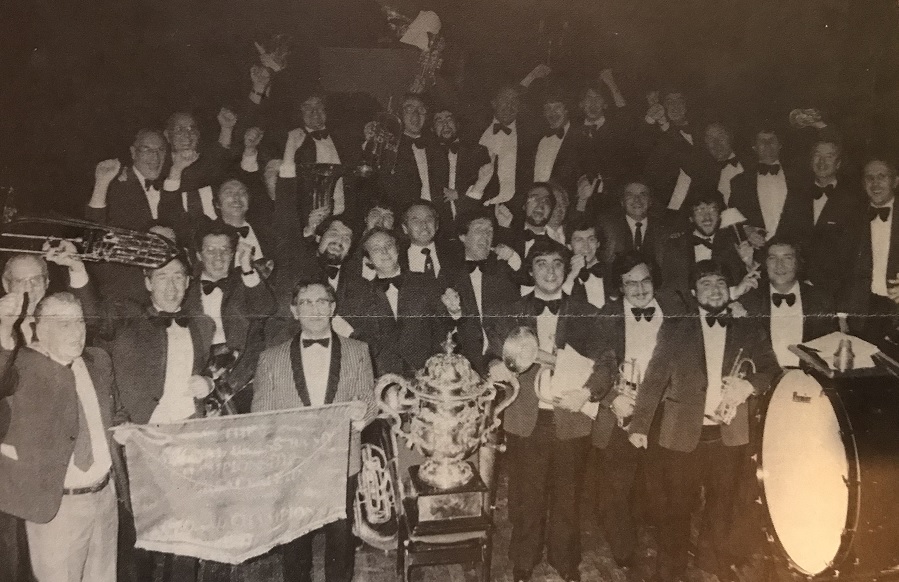
National Champions...
In awe
Even his great contemporary, Major Peter Parkes was in awe of him. “He was the one we all went to see in action when he was in the army. He had everything - perfect technique and authority to his conducting. His musical intellect was immense.
He was the best of all the conductors who came to the brass band movement - on that I have no doubt.”
Major Kenney remained a rather enigmatic figure in the remaining years of his life; his conducting lifestyle a factor in causing the onset of ill health. In 1987 he suffered a stroke.
Although financially pressed, he was always full value for his professionalism wherever he went to conduct in his famous striped contest jacket – even in the lesser company of the likes of Tilbury, Trefor, Parc & Dare, Kinneil Colliery, Ebbw Vale, Cinderford, Aldbourne and Corsham.
He had everything - perfect technique and authority to his conducting. His musical intellect was immense. He was the best of all the conductors who came to the brass band movement - on that I have no doubt.”
Reputation
His time had passed and although he never again reached the very top plateau of competitive success, he led Cory to the Welsh Area title in 1988.
His reputation however had long been sealed as a truly great brass band conductor. Fittingly, his last contest success came in 1992 with Cory in a domestic Welsh Championship contest in Treorchy, his last appearance the following year at the Welsh Regional Championships.
The banding world was saddened to hear of his eventual decline and death aged 75 on 20th July 1994.
100 years after his birth, the lasting memory of Major Horatio Arthur Kenny remains as one of respect, affection and admiration by all who were fortunate enough to have seen him on the rostrum.
Tim Mutum



